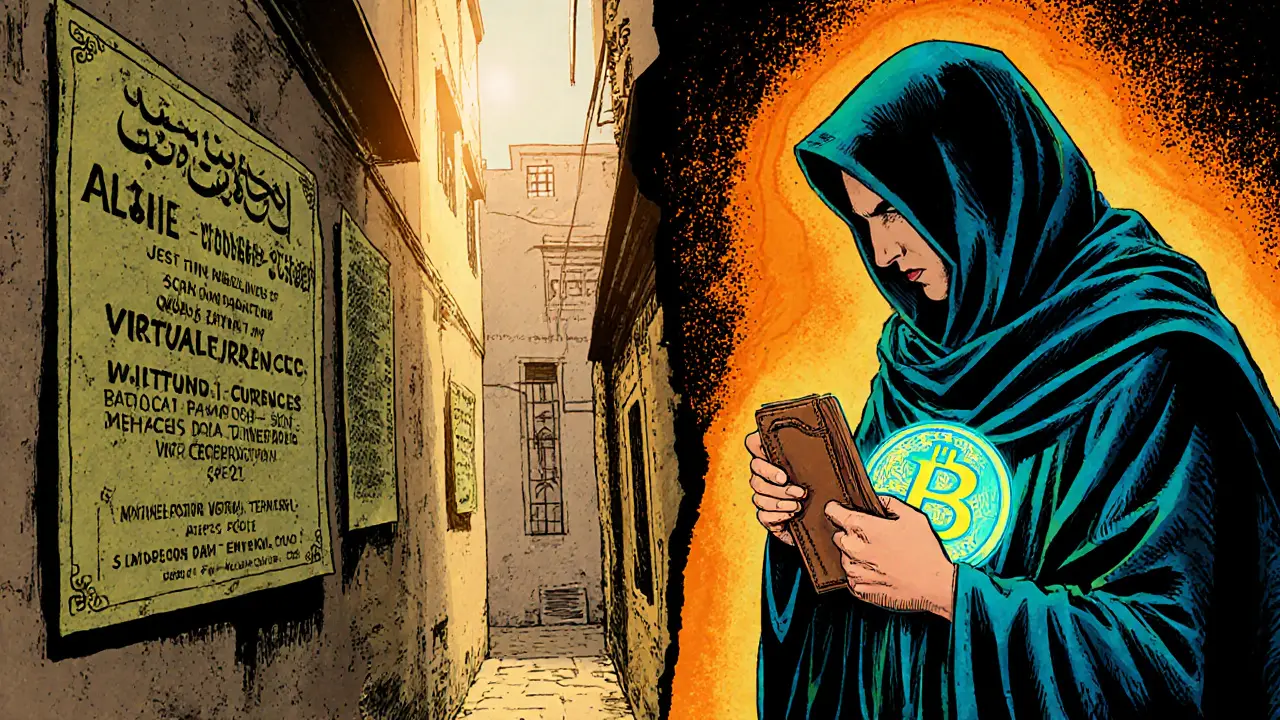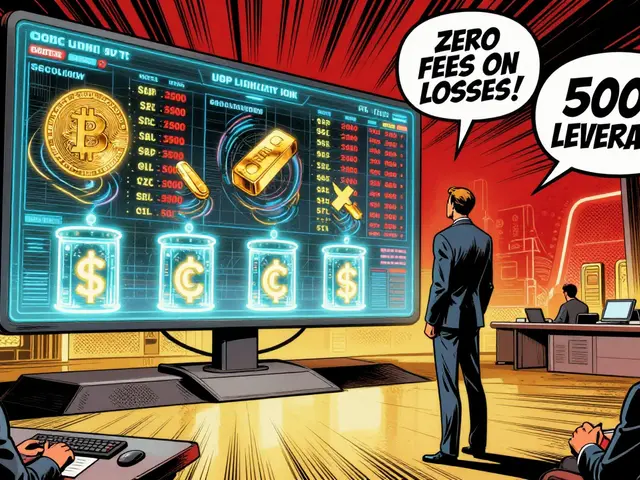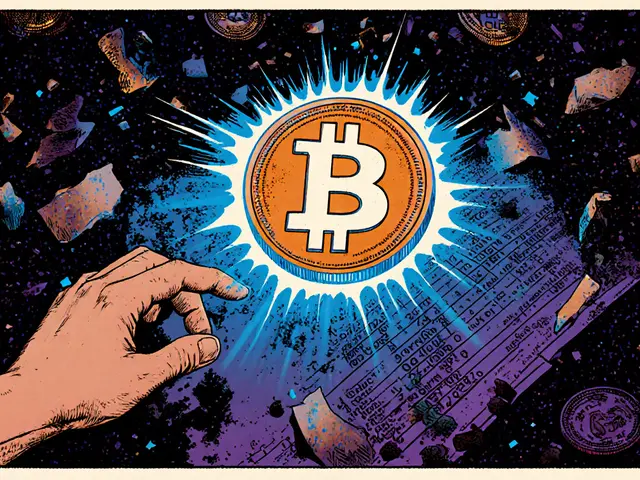
Algeria Crypto Ban Penalty Calculator
Potential Legal Consequences
Prison Sentence:
Fine Range:
Minimum Penalty
Prison:
Fine:
Maximum Penalty
Prison:
Fine:
For anyone watching crypto news, the shift in Algeria cryptocurrency ban feels like a sudden cliff drop. What started as vague wording in a 2018 finance rule has become a full‑blown criminal prohibition in 2025. This article walks through every step of that transformation, spells out what the law actually bans, shows the penalties you could face, and explains why the move matters for Algerians and for the wider crypto world.
Key Takeaways
- Algeria’s 2018 Financial Law first hinted at a crypto ban but left enforcement murky.
- Law No.25‑10, published on 24July2025, criminalises every interaction with virtual assets - from buying to merely holding a coin.
- Penalties range from two months to one year in prison plus fines of 200000-1000000DZD (≈$1540-$7700).
- Bank of Algeria, the Banking Commission, judicial and security authorities all share enforcement duties.
- The ban puts Algeria among the world’s most restrictive crypto jurisdictions, contrasting sharply with regional moves toward regulation.
From Ambiguity to Absolute Prohibition
Algeria is a North‑African nation that has long guarded the Algerian dinar as the sole legal tender. In 2018 the country introduced its first formal stance on digital money through the Financial Law of 2018, which simply forbade the "purchase, sale and use" of virtual currencies. The law didn’t define specific crimes, nor did it outline clear penalties. As a result, many Algerians treated the rule as a grey zone - some kept using Bitcoin to hedge against inflation, while others stayed away out of caution.
Fast forward to July2025. The government released Law No.25‑10, a sweeping statute that criminalises any activity linked to crypto assets. The wording is exhaustive: issuance, trading, possession, advertising, mining, even discussing crypto on social media can land you in court.
What Exactly Is Prohibited?
Law No.25‑10 draws a hard line around eight core actions. If you engage in any of them, you’re committing a punishable offence:
- Creating or issuing new virtual tokens.
- Buying or selling crypto on any platform - local or overseas.
- Holding crypto in a wallet, no matter how small the amount.
- Using crypto as a payment method or investment vehicle.
- Speculating on price movements (including day‑trading).
- Advertising, promoting or publishing content that encourages crypto usage.
- Operating a crypto‑exchange or providing related services.
- Mining digital coins using computing power.
The law’s breadth means that even a casual conversation about “how to buy Bitcoin” can be interpreted as illegal promotion.
Penalty Structure and Enforcement Machinery
Violators face a mix of jail time and monetary fines. The table below summarises the statutory ranges:
| Offence | Prison Sentence | Fine (DZD) |
|---|---|---|
| Possession of any crypto | 2-12 months | 200,000-1,000,000 |
| Trading or selling | 4-12 months | 300,000-1,000,000 |
| Creating/issuing tokens | 6-12 months | 500,000-1,000,000 |
| Advertising or promoting | 2-8 months | 200,000-800,000 |
| Mining operations | 4-12 months | 400,000-1,000,000 |
Enforcement is a coordinated effort. The Bank of Algeria monitors the financial system for any crypto‑related flows. The Banking Commission ensures that banks do not facilitate illegal transactions. Judicial courts prosecute cases, while security agencies conduct digital surveillance and physical raids to seize equipment or wallets.

Why the Ban Is So Strict
Three main arguments drive the policy:
- Monetary sovereignty: Officials claim crypto threatens the dominance of the Algerian dinar and could fuel capital flight.
- AML/CTF compliance: The Financial Action Task Force (FATF) guidance pushes countries to curb money‑laundering channels, and Algeria has framed the ban as a preventive measure.
- Energy consumption: Mining consumes a lot of electricity, a scarce resource in a country where energy subsidies already strain the grid.
While these reasons sound logical on paper, critics argue the blanket criminal approach ignores the potential economic benefits of regulated crypto activity.
Algeria vs. the Rest of the World
Most jurisdictions are moving toward regulated acceptance. Europe is finalising the MiCA framework, the United Arab Emirates and Bahrain have issued licences for exchanges, and the United States is focusing on clear tax and securities rules. Algeria’s stance now mirrors the former Chinese crackdown - but without the recent soft‑launch of “pilot zones”. The result: Algeria sits in a tiny pool of countries where even owning a fraction of Bitcoin can land you in jail.
Real‑World Impact on Algerian Users
Before 2025, a modest crypto community existed under the radar. People used peer‑to‑peer apps, trusted overseas wallets, and even taught blockchain basics in private meet‑ups. The 2018 law’s vague language meant enforcement was sporadic; many users slipped through unnoticed.
After the 2025 decree, that safety net vanished. Possessing a few dollars’ worth of Bitcoin now triggers a criminal investigation. Influencers who once posted “how‑to‑buy crypto” tutorials have deleted their channels to avoid prosecution. Even universities are told not to include blockchain modules in curricula.
For everyday Algerians, the ban removes a tool that could have helped hedge against high inflation and strict capital controls. It also pushes crypto activity underground, making it harder for authorities to track - a paradox that could undermine the very security the law seeks to protect.
Looking Ahead: Will the Ban Hold?
Enforcing such an all‑encompassing prohibition is technically challenging. Digital wallets can be hidden, VPNs mask IP addresses, and decentralized finance platforms operate beyond any single nation’s reach. As global crypto adoption accelerates, pressure may build for Algeria to reconsider or at least create a regulated sandbox.
Regional neighbours that embrace blockchain are already reaping benefits: faster remittances, new fintech jobs, and foreign investment. Algeria risks falling behind unless it finds a balance between security concerns and innovation opportunities.
Frequently Asked Questions
Is it illegal to own a cryptocurrency wallet in Algeria?
Yes. Law No.25‑10 criminalises possession of any virtual asset, regardless of amount. Even a dormant wallet can be considered an offence.
What are the typical fines for crypto‑related crimes?
Fines range from 200000 to 1000000 Algerian dinars (about $1540‑$7700), depending on the severity of the offence and whether it involved large‑scale operations.
Can I still trade crypto on foreign exchanges?
Technically it is prohibited. Accessing foreign platforms counts as trading, which carries the same penalties as domestic activity.
How does the ban affect businesses that want to accept crypto payments?
Using crypto as a means of payment is a criminal act under the law. Companies risk both fines and imprisonment for employees involved.
Is there any chance the law will be softened in the future?
Experts say the current framework is very rigid, but sustained economic pressure and regional competition could push the government toward a regulated approach. Until then, the ban remains fully enforceable.






There are 15 Comments
Alie Thompson
It is utterly abhorrent that a sovereign state would deliberately suppress a technology that holds the promise of financial emancipation for its own populace. By criminalising mere possession, the Algerian government is not protecting its citizens; it is shackling them to a faltering fiat system that has historically failed to preserve wealth. The ethical implications are stark: an adult who merely wishes to safeguard modest savings finds themselves labeled a felon, a designation that carries stigma far beyond the courtroom. Moreover, this draconian stance betrays a profound mistrust of the public’s capacity for responsible stewardship of digital assets. The law’s blanket prohibition ignores the nuanced reality that crypto can serve as a hedge against inflation, a tool for remittances, and a catalyst for entrepreneurial innovation. In the name of monetary sovereignty, the state is, paradoxically, undermining the very economic stability it purports to protect. The punishments, which range from a couple of months to a year of imprisonment, are grossly disproportionate to the alleged harm. Such punitive measures echo a punitive mindset that values control over empowerment. This policy also sends a chilling message to educators, technologists, and innovators who might otherwise contribute to a burgeoning digital economy. It is a glaring example of regulatory overreach motivated more by political expediency than by any genuine security concern. The punitive apparatus, from the Bank of Algeria to security agencies, appears geared toward intimidation rather than constructive oversight. By driving crypto activity underground, the ban may paradoxically increase the very risks it claims to mitigate, fostering a black market that evades any form of accountability. Internationally, Algeria’s stance isolates it from a global trend toward nuanced regulation that balances risk with opportunity. The long‑term socioeconomic costs of stifling a potentially transformative technology could far outweigh any short‑term gains in perceived financial control. Citizens deserve transparency, proportionality, and, above all, the freedom to explore innovative financial tools without the threat of incarceration. The moral imperative, therefore, is clear: law reform must replace blanket criminalisation with measured, rights‑respecting frameworks that truly safeguard the public interest.
Samuel Wilson
While the legislation is stringent, it is essential to remain vigilant and encourage informed discourse.
Rae Harris
Honestly, the Algerian ban feels like a retrograde move straight out of a pre‑blockchain era; it neglects the layered complexities of DLT, DeFi, and the tokenomics that could empower a nascent fintech ecosystem. The law's blanket language basically treats any smart contract interaction as a felony, which is a massive oversimplification of the underlying protocol mechanics.
Danny Locher
I get why the government is scared, but it’s hard not to feel sorry for folks who just wanted a safe place for savings. It’s a tough spot, and the penalties seem harsh for something many see as just a digital wallet.
Emily Pelton
Listen, Algeria, you’re missing a massive opportunity,; the world is moving toward decentralized finance,; you should reconsider this heavy‑handed ban,; think about the innovators, the entrepreneurs, the everyday people who could benefit,; a balanced regulatory framework would serve you better than outright criminalization,; change the narrative now.
sandi khardani
What we are witnessing here is a textbook case of a government that has failed to adapt to technological progress, opting instead for the safest, most reactionary path imaginable. By imposing draconian penalties that range from mere months to a year in prison, the authorities are effectively criminalising curiosity and basic financial autonomy, which in turn fuels a black‑market economy that is far less controllable. The law’s sweeping language, covering everything from token issuance to casual discussion, demonstrates a profound misunderstanding of how blockchain ecosystems function. It also reflects an alarmist mindset that equates every crypto‑related activity with money laundering, ignoring legitimate use‑cases such as remittances and hedging against hyperinflation. Moreover, the punitive approach will likely drive talent abroad, causing a brain drain that weakens Algeria’s long‑term economic prospects. In short, the ban is a self‑inflicted wound that will cost the country far more than any perceived security benefits could ever justify.
Donald Barrett
This ban is nothing but an authoritarian overreach that will stifle innovation and push crypto activity into the shadows.
Christina Norberto
One must consider the broader geopolitical agenda at play; the timing of Law No.25‑10 aligns suspiciously with international pressure to curb independent financial channels that could evade traditional surveillance. The narrative that this is purely a domestic monetary sovereignty issue neglects the fact that powerful banking interests stand to gain from eliminating any alternative that could erode their monopoly. Furthermore, the severe penalties imposed appear designed to instill fear, thereby ensuring compliance through intimidation rather than legitimate regulatory oversight. This strategy, while ostensibly protective, in reality undermines civil liberties and fosters an environment ripe for corruption, as selective enforcement becomes a tool for political leverage. It is no coincidence that the law also targets online discourse, effectively censoring any dissenting viewpoints that might challenge the status quo, thus consolidating the state's narrative.
Fiona Chow
Oh great, another country decides that the future of money is best handled by a 1970s‑style ban. Meanwhile, the rest of the world is figuring out how to tax it responsibly.
Millsaps Delaine
From an intellectual standpoint, the Algerian prohibition epitomizes a misapprehension of monetary evolution, wherein the state erroneously perceives itself as the sole arbiter of legitimate exchange mechanisms. This draconian legal codex, predicated upon an antiquated fixation with fiat hegemony, neglects the ontological shift introduced by decentralized ledger technologies, thereby consolidating a monopolistic grip on financial sovereignty that is antithetical to progressive economic thought. Moreover, the punitive parameters-ranging from meager incarceration periods to comparatively modest fiscal sanctions-exhibit a paradoxical dissonance, suggesting a superficial attempt at deterrence that fails to address the underlying ideological rigidity. Such a policy, while cloaked in the rhetoric of national security, ultimately serves as an impediment to entrepreneurial dynamism, stifling the emergence of a nascent digital economy that could otherwise catalyze systemic growth and inclusive prosperity. In essence, the legislation reflects a myopic worldview that eschews the transformative potential inherent in blockchain innovation.
Ayaz Mudarris
It is imperative for stakeholders to recognize that the current legislative framework, while restrictive, can be leveraged as a catalyst for constructive dialogue. By engaging with policymakers, the community can advocate for a balanced regulatory approach that safeguards both economic stability and individual liberty.
Irene Tien MD MSc
Let’s not be coy about the fact that this law looks like a playbook straight out of a dystopian novel, where a central authority decides who gets to own a byte of freedom. The colorful tapestry of conspiratorial whispers-about secret cabals of bankers, hidden surveillance satellites tracking wallet addresses, and a grand design to reroute capital away from the people-cannot be dismissed as mere paranoia; it reflects a deep-seated unease that the state’s heavy‑handed tactics are feeding. By criminalising even the smallest digital token, the regime is effectively turning the blockchain into a mythic beast, feared and misunderstood, while the real monsters-unchecked power and opaque financial systems-remain unchallenged. The bizarre paradox is that the attempt to control this technology may actually accelerate its allure, drawing the curious and the rebellious into an underground ecosystem that is harder to monitor, thereby undermining the very objective the law seeks to achieve.
kishan kumar
In the grand tapestry of socio‑economic governance, one might reflect upon the ontological implications of criminalising a decentralized ledger, a phenomenon that, while technologically novel, reflects timeless human aspirations for autonomy and self‑determination. 🌐
Anthony R
It is worth noting, with all due respect, that the tone of the preceding discourse could benefit from a measured degree of civility; overly aggressive rhetoric risks alienating those we hope to inform.
Vaishnavi Singh
Indeed, the balance between regulation and freedom remains a delicate philosophical dilemma.
Write a comment
Your email address will not be published. Required fields are marked *